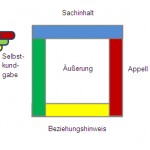1. The term "motivation" The word "motivation" comes from the Latin "motivus", meaning to trigger movement. Motivation refers to internal processes (driving forces, needs, attitudes, interests, will) which cause a person to display certain behaviours more often, for longer, more intensively or in a more targeted way (according to Fröhlich & Drever, 1983). Human […]
Monthly Archives: Februar 2013
motivation as an incentive formula
Motivation = Value x Probability Motivation for an action as an incentive to invest time, commitment, money or other resources Subjective value: How important is something to me/the member of staff? Subjective evaluation of the probability that the value will be satisfied by the action. Related terms: Motives, drivers, criteria Subjective probability […]
fair process
Developed by Ulrich Grannemann Fair process in change processes Justice and change management have a certain similarity. Acceptance of the result (or judgement) doesn’t only depend on the justice of it, but also on the way in which the result was reached: It depends on “fair process”. Kim and Mauborgne (2005) describe three main […]
reorganisation and co
Reorganisation and Co.. Changes – Now what? The significance of reorganisation and an example of a support format Alongside personality and family, work has existential significance. Massive turning points and disruptions in the workplace can sometimes lead to damage to a person’s satisfaction and fundamental motivation which is very difficult to repair. They can cause […]
leadership pyramid
Ulrich Grannemann Leadership pyramid How can leadership activities and tasks the sensibly sorted? The purpose of the leadership pyramid is to help with orientation for the breadth and complexity of the tasks and to assist with identifying any neglected leadership areas. Leadership activities can be divided into 4 levels: […]
Die vier Seiten einer Nachricht
Ein echter Klassiker: 4 Seiten einer Nachricht nach Schulz von Thun. Ein bewährtes Kommunikationsmodell mit Grenzen.

